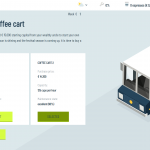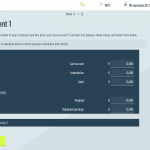Serious Games
FinFun : financial serious game
The benefit of this game lies in the close link between financial learning goals and the game’s challenges. Students make their own choices and, in doing so, are responsible for their business success. They know immediately whether sales are booming (or not) and where they can improve. Because of these quick insights and the freedom of choice, learning becomes more dynamic than learning from a book. In turn, students are more enthusiastic, and they memorise the learning material better.
The benefits of this game are:
- Students are introduced to Finance concepts in a fun way.
- They are more enthusiastic and therefore spend more time on the learning material.
- Because of an integrated learning experience, they understand the material better.
- Their understanding of Finance concepts is assessed through personal assignments.
Case
In the story, a rich uncle gives players money to start a Barista-cart. Once the students get to work, they become responsible for, among others, buying and selling coffee and cart maintenance.
During the game, students are introduced to financial concepts like revenue, depreciation, and profit & loss accounts.
Of course, business is not always as expected. For instance, players can sell coffee at festivals, but what do they do in the case of rain, or extreme heat? The choices players make, affect the way the game continues.
Learning goals
During the game, students make their own choices. This autonomy contributes to intrinsic motivation, and at the same time invites them to consider cause and effect relationships.
Suitable FinFun learning goals are:
- Independently deciding about tactical decisions and investments in an upcoming market;
- Reading and writing financial reports, such as balance sheets, income statements, and cash-flow statements.
- Knowledge of and applying financial concepts like debtors, creditors, and depreciation.
The following financial concepts are introduced in a playful manner:
- Revenue versus Revenue
- Depreciation
- Balance sheet
- Income statement
- Cash flow statement
Assignment module
The game contains an additional assignment module that objectively assesses learning goals. The assignments are based on game data: the decisions players make, affect the outcome. To minimize grading loads for teachers, the game evaluates whether students carried out the assignment correctly.
Program design
The game can be combined with theory and workshops. As students immediately know where in the game they are making mistakes, they know what material to re-read. At the same time, teachers can discuss additional material in a classroom context.


